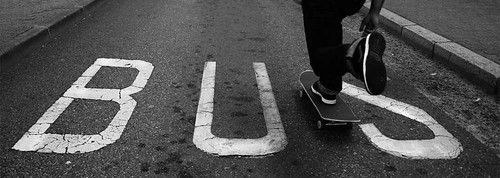BUS STORY # 421 (The Ticket)
 |
| Downloaded from ebay. |
It wouldn’t have happened if the concert hadn’t been scheduled in Santa Fe on Sunday afternoon. Or if the Rail Runner didn’t have such a skimpy Sunday schedule. Or if ABQ RIDE didn’t cut off my neighborhood on its Sunday routes.
Of course, it also wouldn’t have happened if I had been paying attention to the speed limit instead of spreading my focus to the coming concert, the lively conversation my wife and I were having, and the magnificent vista that opens out before you when Tramway turns west and drops down toward I-25.
I saw flashing lights in my rear view mirror. I thought it was an ambulance, and slowed, then pulled over to let it pass. It slowed, too, and pulled up behind me. The “ambulance” was an SUV driven by a Sandia Pueblo police officer.
I consider myself a conscientious driver. I am attentive to speed limits, and especially attentive on this particular road. Many are the times I’ve seen cars pulled over here. Many are the times I’ve been tailgated, then angrily zoomed around, because I was holding to the limit. Many are the times I’d watch those drivers rocket downhill with impunity and wonder where the cops were.
Be careful what you wish for.
The officer told me I was going 54 in a 40 mile-per-hour zone. I was genuinely surprised. He also told me that my record was clean, and I had some options. One of them was to make a court appearance without admitting guilt. Apparently, some judges will let someone with no previous driving infractions off on the condition they attend a driving class.
I asked if that meant the ticket would be thrown out.
Yes, assuming the option was offered and I took the class.
I found myself conflicted. If the judge gave me a break, I would not have to pay the fine and I would not have to face the probability of increased car insurance premiums for who knows how long. On the other hand, there was no question I was guilty of speeding.
More, even though I had not been intentionally speeding, nor driving under the influence, I had been engaged in what is a current public safety concern: distracted driving. I’d been so distracted I’d forgotten where I was, and had not even seen the speed limit sign.
I elected to acknowledge I’d violated the law and to pay the fine. The fine was $90.00 -- exactly the cost of my annual bus pass which I had purchased partly to save myself all that money driving a car would cost me.
I feel at peace with my decision. But for the record, your honor, it wouldn’t have happened if public transportation had been an option.




